What is the history of coffee cultivation in Uganda?
Professional coffee knowledge exchange more coffee bean information please follow the coffee workshop (Wechat official account cafe_style)

Uganda, I believe that many coffee lovers and baristas are familiar with each other, but also some strangers.
It is familiar because Ugandan coffee has recently emerged in international competitions, and several high-quality Ugandan coffees have been introduced in China. Unfamiliar, because Ugandan coffee does not have such famous names as Panama, Ethiopia, Kenya and Colombia, and domestic coffee people rarely have access to high-quality Ugandan coffee.
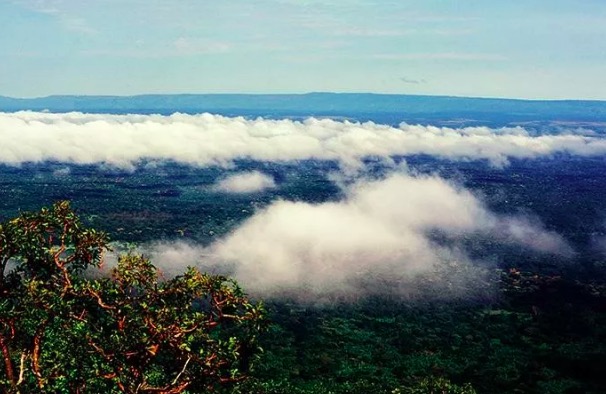
The beautiful and beautiful natural scenery of Uganda
But as the saying goes, the smell of wine is not afraid of the depth of the alley, good coffee will come to the fore one day. Today, we will tell the story of Ugandan coffee.
A coffee-producing country with equal emphasis on Robsta and Arabica
Uganda is a landlocked country in Africa without the sea, straddling the equator, bordering Kenya to the east, Tanzania and Rwanda to the south, the Democratic Republic of the Congo to the west, and South Sudan to the north. Uganda is mostly located in the East African Plateau with lakes, with an average elevation of 1000 to 1200 meters above sea level. Uganda is known as the "watery country of the plateau". Uganda has vast and magnificent natural beauty unparalleled in East Africa.
The history of coffee cultivation in Uganda dates back to more than 100 years ago, when Uganda first introduced coffee from Ethiopia. Later, Uganda was colonized by the British and Robusta coffee was widely grown there.
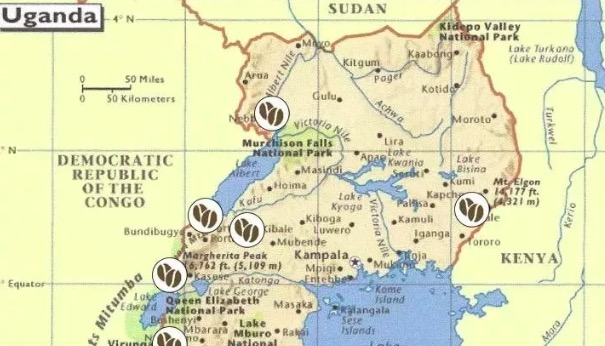
Map of coffee producing areas in Uganda
Coffee is the largest crop in Uganda and earns the most foreign exchange. 25% of the country's population is engaged in the coffee industry, and the vast majority of them grow coffee on farms (there are about 500000 coffee farms in Uganda). Of the Ugandan coffee beans, the vast majority are robusta, and only 6% are Arabica.
Overview of Ugandan Coffee
Coffee in Uganda is divided into Robusta and Arabica. Robusta coffee is grown in low-altitude areas of central, eastern, western and southeastern Uganda, up to 1200 meters above sea level. Arabica coffee is grown in the highlands of the slopes of Mount Mount Elgon in the east and Mt in the southwest. Rwenzori and Mt. Muhabura (altitude 1500-2300 m).
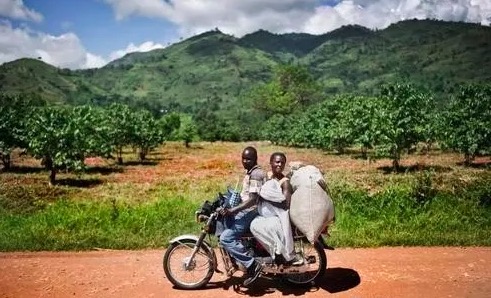
Coffee farmers in Uganda
Ugandan coffee is full-bodied and fruity with distinct layers of flavor. Arabica coffee in Uganda is mainly made of traditional varieties such as Kent, Tieka and SL-14,SL-28, while Robusta has two varieties of coffee: & # 39; Nganda Nganda' and & # 39; Erecta & # 39;
The local coffee processing methods in Uganda can be divided into two types: Drugar and wugar. The grading system is relatively primitive, and the coffee beans are classified as AA,A,B,C,PB (round beans) and E (elephant beans).
Carry the banner of boutique Robusta
Uganda, like Congo, is the birthplace of Robusta, Africa's second-largest coffee exporter, accounting for 7% of the world's output.
Unlike Arabica, Robusta's coffee has long been thought to be wilder, more common and cheaper. But for Uganda, it has the potential to produce the highest quality Robusta because its unique flavor is accompanied by good growth conditions, including soil fertility, relative height and climate.
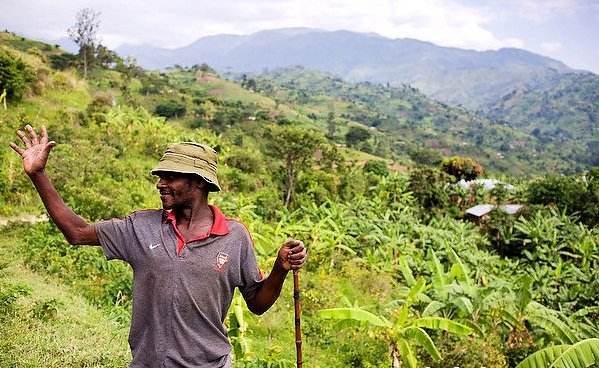
In July 1991, the Uganda Coffee Development Authority (UCDA) was formally established. UCDA regularly trains farmers all over the country to produce high-quality coffee through good handling. In 2008, CQI held an agreement in Uganda to establish a quality system for boutique Robusta. Since then, Uganda has paid more attention to the development of its Robusta.
At the same time, Uganda has also joined the Taste of Harvest (TOH) "Harvest Monsoon Cup Test Competition" to select more boutique coffee according to sca standards, so that the world can realize the beauty of Ugandan coffee.
Important Notice :
前街咖啡 FrontStreet Coffee has moved to new addredd:
FrontStreet Coffee Address: 315,Donghua East Road,GuangZhou
Tel:020 38364473
- Prev

Cold knowledge, some relationships between Arabica and Robasta
Professional coffee knowledge exchange more coffee bean information Please follow the coffee workshop (Wechat official account cafe_style) now people who know a little about coffee will basically say: I want to drink 100% Arabica. Arabica is good coffee and Robusta can only be instant, which has become a stereotype in many people's minds. No matter what kind of work it is, what kind of gay it is,
- Next
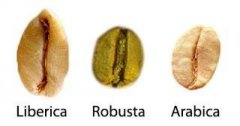
Lilika Coffee, a big seed in the coffee world. Why is Liberika so rare?
Professional coffee knowledge exchange more coffee bean information Please follow the coffee workshop (Wechat official account cafe_style) friends who have some knowledge of coffee should know that coffee beans are divided into three main categories: Arabica of small seed, Robusta of medium seed and Liberica of large seed, while we
Related
- Unexpected! Ruixing Telunsu lattes use a smoothie machine to foam milk?!
- % Arabia's first store in Henan opens into the village?! Netizen: Thought it was P's
- Does an authentic standard mocha coffee recipe use chocolate sauce or powder? Mocha Latte/Dirty Coffee/Salty Mocha Coffee Recipe Share!
- What is the difference between Vietnam egg coffee and Norway egg coffee? Hand-brewed single product coffee filter paper filter cloth filter flat solution!
- What is the difference between sun-cured and honey-treated coffee? What are the differences in the flavor characteristics of sun-honey coffee?
- How to make Italian latte! How much milk does a standard latte use/what should the ratio of coffee to milk be?
- How to make butter American/butter latte/butter Dirty coffee? Is hand-brewed coffee good with butter?
- Is Dirty the cold version of Australian White? What is the difference between dirty coffee/decent coffee and Australian white espresso?
- Relationship between brewing time and coffee extraction parameters How to make the brewing time fall to 2 minutes?
- Got entangled?! Lucky opens a new store, Mixue Ice City, and pursues it as a neighbor!

